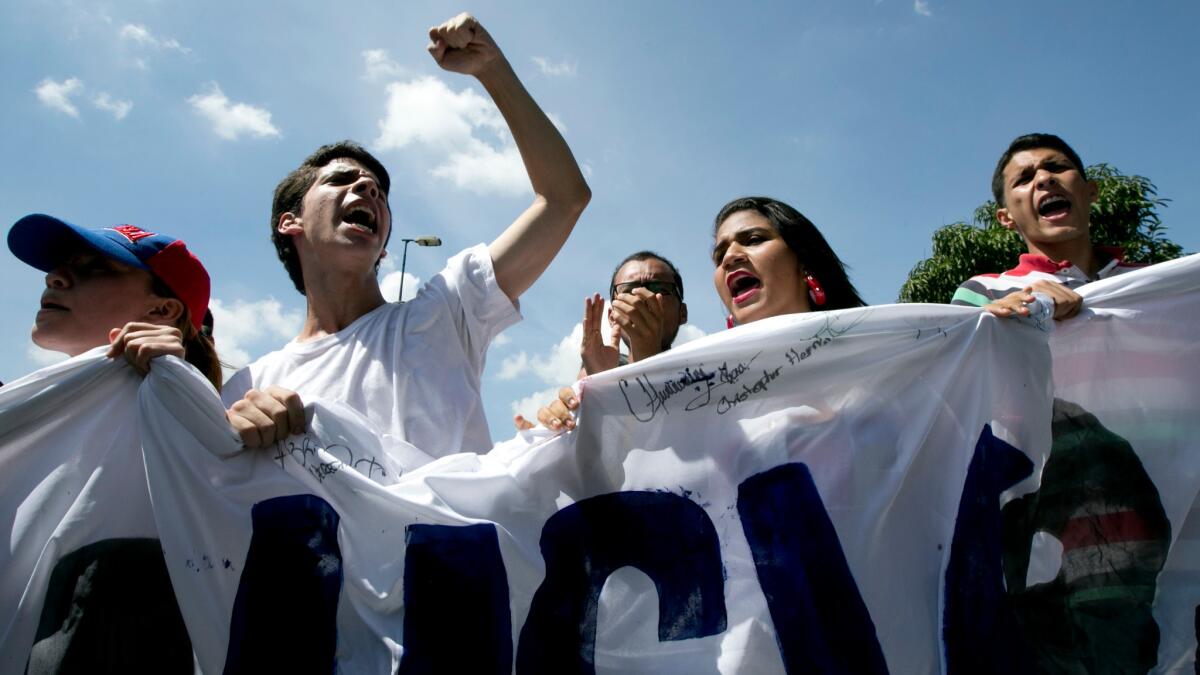Anger grows as Venezuela blocks effort to recall president

- Share via
Reporting from Caracas, Venezuela — In what critics blasted as the latest efforts of an embattled government to quash dissent, Venezuela’s electoral council derailed efforts to recall President Nicolas Maduro, and a judge ordered eight prominent opposition leaders not to leave the country, a move that could presage their arrests.
Dissatisfaction with Maduro’s government is widespread due to ongoing scarcities of food, triple-digit inflation and rising violent crime. A report to be issued Monday by Human Rights Watch is expected to show alarming increases in infant and maternal fatalities in Venezuelan hospitals due to shortages of medical supplies and equipment.
Maduro has responded to dissent with increasingly autocratic measures, including moves to weaken the opposition-controlled National Assembly. Experts have described those moves as unconstitutional.
Those criticisms were leveled again Friday, a day after the National Electoral Council indefinitely suspended the collection of signatures intended to force a recall election to force Maduro from office.
The council’s action came the same day a judge in western Carabobo state issued, without explanation, an order prohibiting the eight opposition leaders, including former presidential candidate Henrique Capriles, from leaving Venezuela.
Capriles ran unsuccessfully against Maduro after the March 2013 death of longtime Venezuelan leader Hugo Chavez. Maduro’s term is scheduled to end in April 2019.
Henry Ramos Allup, president of the National Assembly in which opposition deputies represent a majority, said on social media Friday that Venezuela is “living in a dictatorship that is the product of a continuing coup d’etat.”
Earlier this month, the Maduro-controlled Supreme Court took the unprecedented step of transferring budget-setting power from the National Assembly to Maduro. It was one of more than 20 decisions since the opposition gained a majority in January that the court has steadily stripped the assembly of its constitutional powers.
In interviews with local media Friday, Jose Vicente Haro, a Caracas-based constitutional law expert, said the recall process acts as a “democratic escape valve” and that its suspension by the court is a first in Venezuelan history. The order shows a lack of respect for “the constitution and separation of powers,” he added.
“When this happens there is no democracy. What Venezuela has is dictatorship,” Haro said in an interview with Globovision.
The Washington Office on Latin America think tank on Thursday said the electoral council’s indefinite suspension of the recall signature drive was “a setback for democracy.”
Earlier this week, the Electoral Council, which is controlled by Maduro loyalists, postponed elections of governors and mayors until June of next year from the traditional December balloting date. Local city council voting was put off until the end of 2017. The moves were interpreted by critics as a gamble that Maduro’s popularity might improve in the next few months.
Leftist political scientist Nicmer Evans, a former Chavez supporter, criticized Maduro’s moves such as calling off the recall process as “running counter to democratic principles” and as reflecting Maduro’s “authoritarianism.”
Public outcry is growing. On Monday, three university faculty and trade groups condemned the Supreme Court decisions concentrating power in Maduro, saying the National Assembly should ignore them.
In a joint statement, the university groups said it was “inadmissible” that the government is “impeding the electoral process in total complicity with other state institutions.”
Last Saturday, the nation’s largest attorney trade group said it was in “rebellion” against the decision by the Supreme Court to approve a 2017 budget, a function they said belongs with the assembly. “We demand the rescue of constitutional order,” the attorneys group said.
Maduro has been roundly criticized for taking political opponents prisoner, including former Caracas borough mayor Leopoldo Lopez who has been jailed since February 2014. Other prominent prisoners include former presidential candidate Manuel Rosales, Caracas Mayor Antonio Ledezma and San Cristobal Mayor Daniel Ceballos.
In August, former student leader Yon Goicoechea who now heads the Popular Will opposition party was arrested in Caracas on criminal conspiracy charges and remains imprisoned.
Special correspondents Mogollon and Kraul reported from Caracas, Venezuela, and Bogota, Colombia, respectively.
ALSO
Missile attack hits shrine in Iraqi district of Daquq, killing at least 15 and wounding dozens
Break away from U.S.? Here’s what Philippine officials say Duterte really meant to say
South Africa quitting international court created to prosecute world’s worst criminals
More to Read
Sign up for Essential California
The most important California stories and recommendations in your inbox every morning.
You may occasionally receive promotional content from the Los Angeles Times.













